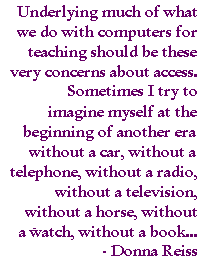
I continue to have reservations, political and personal, about who is getting swept up, and left behind, in our work. Michael Keller and I want to write about access--who gets it, who doesn't, what we buy into ideologically when we make assumptions about students and "the public." As Ann made clear at the end of the Institute, we cannot ignore this issue. America is, always has been, a nation of haves and have nots. Before we add another level to exisiting divisions, anyone who remotely considers her/himself progressive politically should take stock of our assumptions about students' access to networked computing. Moreover, we should consider how we can expand access on our campuses and in our communities. Certainly, this issue is germane when we try to leverage campus and departmental change. - Joe Essid
 Donna continues: And I think about what can be done to provide access for my colleagues and
students as interim access. What would be the equivalent of the way our predecessors dealt with
such inegalities? A bus. A loud voice? A radio in the corner store. A TV at a neighbor's house. A
stagecoach. A clock on the town hall tower. A lending library. I remember one of these
transitions--the first tv my dad brought home--and now 99% of us have at least one. I remember
being out of the country when the moon landing occurred in the middle of the night. We had no
tv, and our downstairs neighbors whom we hardly knew but who knew we were Americans with
few amenities invited us to their apartment at something like 2 or 3 a.m. to watch with them.
They made us tea, too.
Donna continues: And I think about what can be done to provide access for my colleagues and
students as interim access. What would be the equivalent of the way our predecessors dealt with
such inegalities? A bus. A loud voice? A radio in the corner store. A TV at a neighbor's house. A
stagecoach. A clock on the town hall tower. A lending library. I remember one of these
transitions--the first tv my dad brought home--and now 99% of us have at least one. I remember
being out of the country when the moon landing occurred in the middle of the night. We had no
tv, and our downstairs neighbors whom we hardly knew but who knew we were Americans with
few amenities invited us to their apartment at something like 2 or 3 a.m. to watch with them.
They made us tea, too.
 Another distant place I lived, I had a phone but my neighbor didn't. When she needed to make a
call, she came over with half a dozen freshly laid eggs and used our phone. She didn't have a car,
but when we went to town to shop, we invited her to come along for the ride. She didn't need a
car. She did need an occasional bus or taxi and neighbors who wanted to be sure she wasn't stuck
on her farm. When her cow had a calf, she came to get me so I--a suburbanite for most of my
life--could see a newborn. Not a bad trade, I thought.
Another distant place I lived, I had a phone but my neighbor didn't. When she needed to make a
call, she came over with half a dozen freshly laid eggs and used our phone. She didn't have a car,
but when we went to town to shop, we invited her to come along for the ride. She didn't need a
car. She did need an occasional bus or taxi and neighbors who wanted to be sure she wasn't stuck
on her farm. When her cow had a calf, she came to get me so I--a suburbanite for most of my
life--could see a newborn. Not a bad trade, I thought.
So we cannot provide everybody a computer, but maybe we can strive to provide access on our campuses and in our public libraries. We can lobby for putting quality equipment where students and the public can use it to find the information they need and to perform the tasks they need. We can think more in terms of establishing computer-supported learning environments we can share instead of departmental facilities that are idle when there's not an autocad class in session even though the math teachers are clamoring for a place to take a class for mathcad.
This is an oversimplification of complex issues; however, it's also one rationale for not letting the
access issues hold us back but to be mindful of them as part of our planning as we move
forward.
- Donna Reiss
For some participants, this issue hit home because their access to technology translated into access to other people at the same time. Diane Boehm wrote:
I found it most fascinating, and affirming, that our Richmond institute began with enthusiastic conversations about technology--and ended with thoughtful, probing dialogues about ethics and access and professional practice. During the course of the week, I was able to experiment with a wide variety of technologies, from creating a web page to using "sneaker-net." I was grateful for the careful planning and generous sharing of so many people that encouraged so much hands-on learning. But I was even more appreciative of the fact that we were learning these things, not so we could master all that the latest technology has to offer, but so we could be better at the things we care about most: teaching and learning.. . . . So ultimately it was not the tech factor which is likely to have the most permanent impact on me; it is the human factor. My institute colleagues were innovative, insightful, enthusiastic, caring teachers and learners. We shared not only technical expertise; I like to think we shared the best of who we are.
| Formats | Themes | Leaders | People |
Send comments on these pages to: Claudine Keenan
![]()